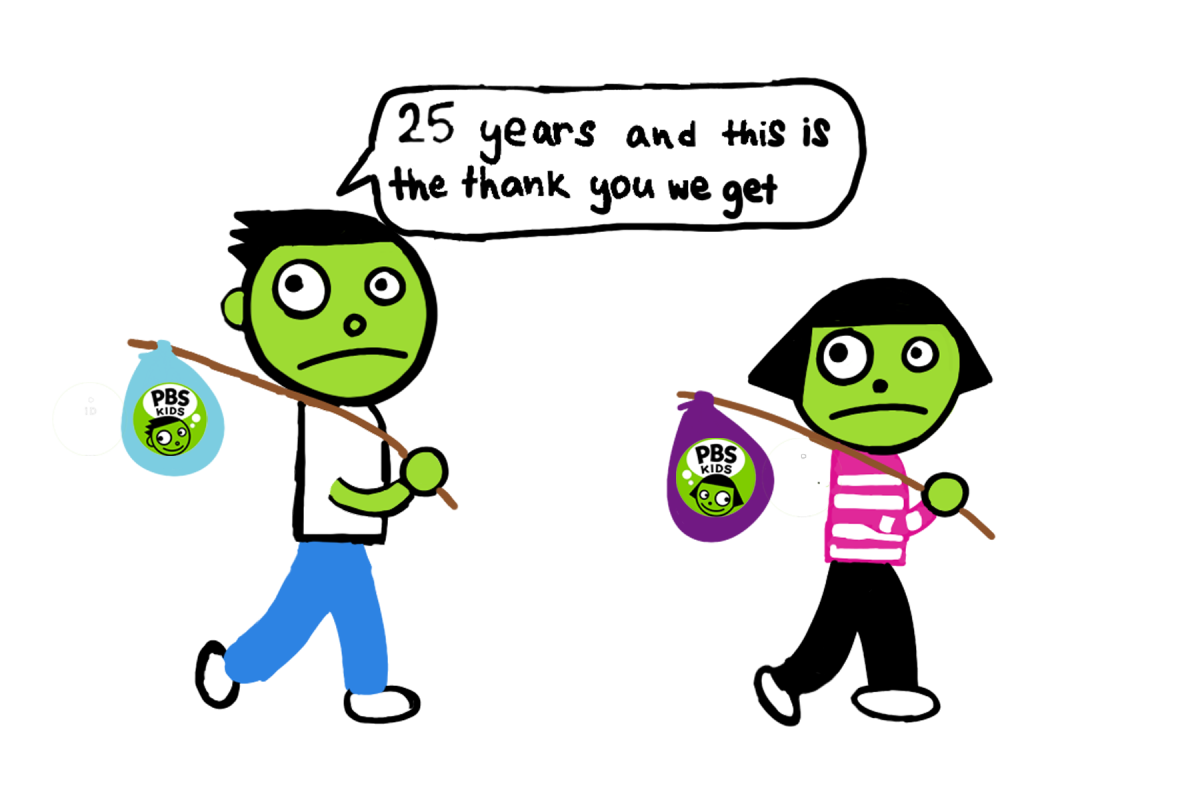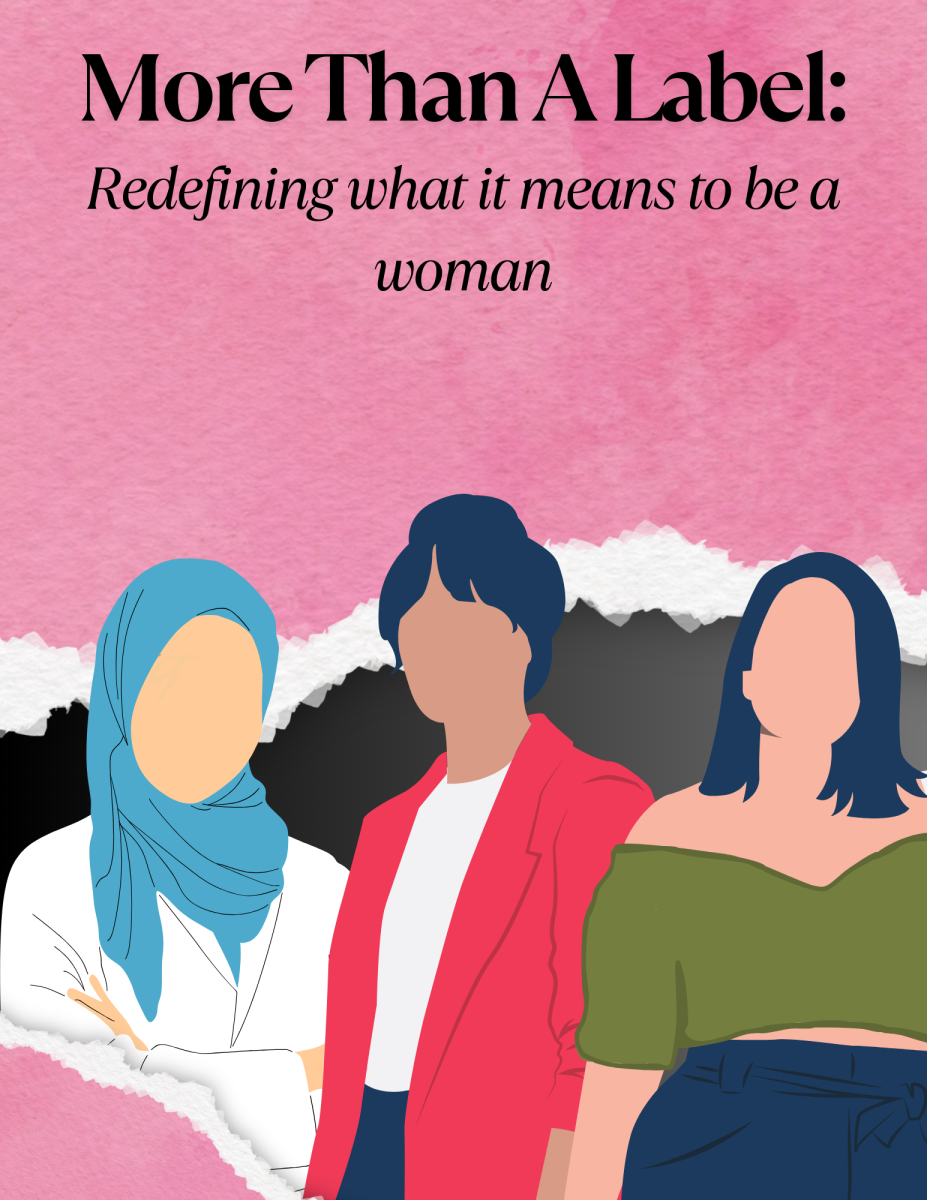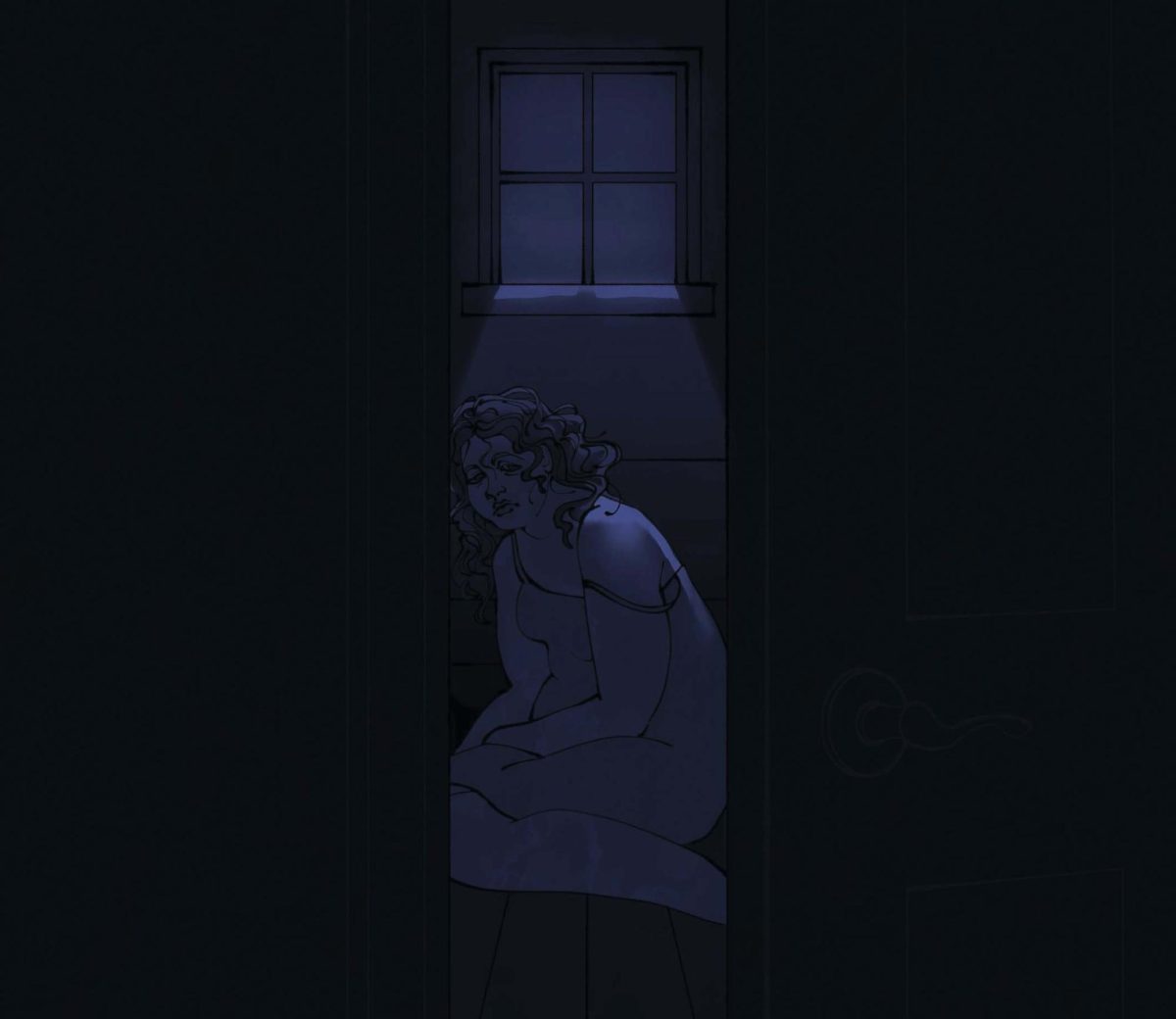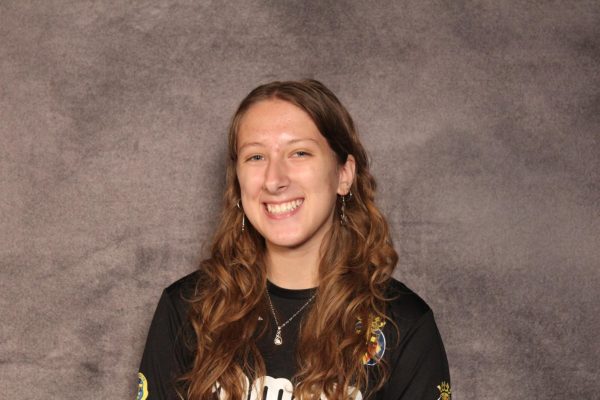The sun is shining through a window. You’ve just gotten home from a long day of multiplication tables and personal narratives. You grab a plastic cup from the shelf, the one with your favorite character on it, fill it, take a sip and abandon it on the counter to go turn on the TV. As you take the clunky remote and click the TV on, a familiar tune fills the air.
“You never do know what’s around the bend, big adventure or a brand new friend, when you’re curious, like Curious George.”
I never knew how true this statement would turn out to be. How life can often be unpredictable and we never do know what will be in store. “Curious George” isn’t the only PBS KIDS show that taught me a valuable lesson though. “Arthur” taught me how to work with others and how to be a better person, “Super Why!” helped me with my reading skills, “The Magic School Bus” taught me about the world of science, “Wild Kratts” taught me about the animals around me and my personal favorite, “Odd Squad”, made me the problem solver I am now.
Good thing I had lessons like this in my childhood to prepare me for my future. Unfortunately, the newest generations may not have this luxury, as the Public Broadcasting Service (PBS)’s downfall may be in our near future.
On May 1, President Donald Trump issued an executive order for the Corporation of Public Broadcasting (CPB) to end federal funding for PBS, as well as NPR, due to alleged bias.
The CPB is a private, non-profit organization, funded by the U.S. government. According to the CPB, its mission is to “ensure universal access to non-commercial, high-quality content and telecommunications services…CPB strives to support programs and services that inform, educate, and enrich the public.”
Although there is speculation on whether this order can be implemented, steps have already been taken to cut funding for some of PBS’s shows. This is through the termination of the Ready to Learn grant by the Department of Education after the end of its previous five-year cycle.
The Ready to Learn grant is a U.S. Department of Education funded program which aims to provide educational television to preschool and early elementary school children, especially children from low-income families. Both CPB and PBS work with the Department of Education to distribute content from this grant.
A few examples of major shows that have been funded by this grant are “Sesame Street”, “Reading Rainbow” and “Clifford the Big Red Dog”. According to Fernando Cervantes Jr.’s USA TODAY article titled “Funding for PBS children’s shows killed by Trump administration citing ‘woke propaganda’”, the cutting of the Ready to Learn grant will “result in a loss of $23 million that the CPB said would have gone to children’s games and educational shows.”
The cutting of the Ready to Learn grant is detrimental enough to PBS but if Trump’s executive order were to be put into place, it would be detrimental to PBS as a whole. There is a good chance this company would cease to exist, since it is a non-profit organization. This means saying goodbye to our childhood.
For me, PBS KIDS was an essential part of my adolescence, so much so that it made its way into my daily routine. After my lunch of mac n’ cheese or possibly a peanut butter and jelly sandwich, I would sit in my grandma’s living room, surfing through cable to finally settle on the PBS KIDS channel. Depending on the day, maybe “Arthur” would come on screen with its catchy theme song singing, “Everyday you’re walking down the street, and everybody that you meet, has an original point of view.”

Or maybe a train whistle sneaks out from the speaker signaling the start of “Dinosaur Train”. Maybe Word Girl flies by the screen on a mission to save the city. It never really mattered which show was on, I was always glued to the soft cushions of our couch until I got told screen time was over.
When that time came, even though I was disappointed to turn off my favorite show, I was filled with more knowledge than I had been 20 to 30 minutes ago. I was filled with more compassion and more critical thinking skills. Things that yes, should be taught in school, but can often be difficult to grasp for young children, especially in an engaging way.
This is why PBS KIDS works as a non-profit to combine education with entertainment for young children. These shows are also free for kids all throughout the U.S., to make sure all children get the opportunity to learn important skills.
According to PBS, PBS KIDS is “available to 95% or more of U.S. TV households”. Additionally, PBS states that, “parents say PBS KIDS is the #1 educational media brand for children”.
Even if you got to watch cable as a kid, not everyone grew up this lucky. So, while PBS KIDS is on cable, children can also access episodes for free from the website. This way kids can watch from their Chromebooks at home, or if they can’t access the internet at home, they could go to the library to watch it. Either way, PBS KIDS is much more accessible than any other children’s channel, teaching children a wide range of subjects.
Shows such as “Arthur”, “Caillou”, “Sesame Street” and “Daniel Tiger’s Neighborhood” (which is inspired by PBS’s previously aired series, “Mister Rogers’ Neighborhood”) teach social-emotional skills while shows like “Wild Kratts”, “The Cat in the Hat Knows a Lot About That!” and “Sid the Science Kid” take a more intellectual route and teach kids about science, technology and engineering.
Shows like “Peg + Cat” and “Odd Squad” assist children in advancing their math knowledge. In fact, PBS KIDS says on their website that “children who used media content from ‘Peg + Cat’ showed improvement in critical math areas involving ordinal numbers, spatial relationships and 3-D shapes.” Additionally, “after engaging with Odd Squad, children’s average scores on post-tests were higher than their average scores on pre-tests for the following math skills: skip counting (25%), simple addition and subtraction (12%) and pattern recognition (7%).”
Moreover, PBS KIDS also helps children with their literacy through shows like “Word Girl”, “Martha Speaks”, “Word World”, and “Super Why!”. “Super Why!” specifically is proven to be beneficial for children; PBS KIDS says “children who watched ‘Super Why!’ scored 46% higher on standardized tests.”
While PBS KIDS may help children with building skills, opposing views may agree with the executive order, believing the larger company, PBS, is biased. They may align with the order’s statement that CPB fails to follow its requirement that it cannot “contribute to or otherwise support any political party”.
Media company AllSides has found evidence that supports the idea of CPB’s failure to follow its requirement, stating that they have found that PBS NewsHour is left leaning, determined from independent review, editorial review and community feedback. This is just an evaluation of PBS NewsHour however, and the executive order affects all branches of PBS, including PBS KIDS.
The executive order could also be referring to the broader messages PBS KIDS sends to viewers, which may be viewed as biased or “woke”. However, in general, the public doesn’t tend to think their money is being wasted on PBS funding.
“PBS ranks highly in terms of taxpayer value, with 66% of respondents calling it an ‘excellent’ or ‘good’ value behind only military defense (73%),” PBS says on their website. “PBS rated higher on this measure than other taxpayer-funded benefits such as social security, agriculture subsidies, infrastructure and environmental protections.” Furthermore, a survey conducted by YouGov in January 2025, found that PBS has ranked first in terms of public trust for 22 years.
Additionally, in Cervantes Jr.’s USA TODAY article mentioned above, he talks about a statement sent to USA TODAY from Madi Biedermann, a spokesperson for the Department of Education. In this statement Biedermann established that the defunding of the Ready to Learn program was to cut funding for “racial justice educational programming”.
According to the National Education Association, “Racial Justice is the systematic fair treatment of people of all races that results in equitable opportunities and outcomes for everyone.” So, it can be assumed from this definition that educational programming about racial justice would teach children about racism and how to actively prevent it- something so clearly beneficial for a wide range of people.
While Trump does claim that his cuts to PBS and the Ready to Learn grant are due to bias and ‘woke propaganda’, some “Sesame Street” viewers speculate that Trump is cutting funding to PBS, more specifically, “Sesame Street”, because of grievances about two of the show’s characters, which seem to mock him.
The first of the two is Ronald Grump, who appears in episode 2399. During this episode, Ronald builds Grump Tower while simultaneously swindling Oscar the Grouch.
The connection to Trump can be made in this episode not only from the similarity in their names but also because Trump has his own skyscraper named Trump Tower.
The second “Sesame Street” character which seems to parody Trump is Donald Grump in episode 4104. In this episode, while Donald is looking for an apprentice, he demeans the other Grouches by bragging about how he has more trash than all of them. This clearly resembles Trump through the character’s name as well as how Donald is looking for an apprentice, as how Trump looks for an apprentice in the reality TV show, “The Apprentice”.
Whether or not Trump is cutting funding to PBS for alleged bias or for personal reasons, it could be highly detrimental to the education of children. For this reason, PBS continues to fight to keep reaching kids across the U.S.
“This decision removes a critical resource public television has used to enable us to create high-quality, educational PBS KIDS content while opening up worlds of possibilities for millions of kids across the country. We will continue to fight in order to maintain our essential service,” Sara DeWitt, Senior Vice President and General Manager of PBS KIDS, said in a statement to USA TODAY.
You can fight to keep PBS KIDS alive too. If you donate, you give the next generation opportunities to experience the childhood you did, filled with days of hearing Ms.Frizzle yell to her students, “Seatbelts, everyone!” or the Kratts brothers cheer “Creature power!” You give these children the chance to relive the years you may be far beyond. Remember, “This program was made possible by contributions to your PBS station from viewers like you. Thank you!”







